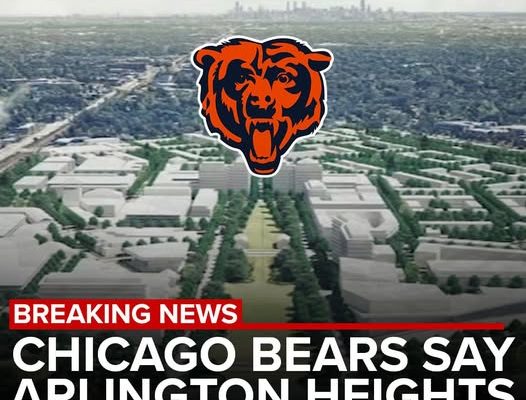The news that the Chicago Bears, one of the NFL’s oldest and most storied franchises, are set to leave the Windy City has sent shockwaves across the sports world and left fans in disbelief. For over a century, the Bears have been more than just a football team to Chicago; they have been a civic institution, a source of pride, and a symbol of grit and resilience for generations of residents. The very idea that this historic franchise would pack its bags and leave the city it has called home since its founding in 1920 feels almost unthinkable to many, yet here we are, staring down the reality of a future where the Bears no longer take the field under the shadow of the Chicago skyline. The decision, while still surreal to some, appears to be the culmination of years of financial disputes, stadium negotiations, and changing visions for the franchise’s future, and it represents one of the most significant shifts in the NFL landscape in recent memory.
The Bears’ departure from Chicago is not something that materialized overnight. The seeds of this moment were planted years ago, when conversations about Soldier Field’s limitations began to dominate headlines. While the iconic stadium is deeply embedded in the team’s history and in the city’s cultural fabric, it has long been criticized for its outdated amenities, limited seating capacity, and logistical constraints. Despite multiple renovations over the years, Soldier Field has struggled to keep pace with the modern, revenue-generating stadiums that many NFL teams now call home. Discussions between the team and the city regarding potential upgrades or even a brand-new stadium often broke down over costs, timelines, and location. The Bears’ ownership has maintained for years that in order to compete both on the field and financially off it, the team needed a more state-of-the-art facility that could accommodate larger crowds, generate more income through luxury suites and sponsorship opportunities, and provide the type of fan experience that has become standard in the NFL.
This simmering tension between the Bears and Chicago city officials escalated when reports began to surface that the team was considering building a massive stadium complex in the suburbs, particularly in Arlington Heights, where they had purchased land. Initially, many fans dismissed the rumors as a negotiation tactic—pressure on the city to come to the table with a better deal for renovations or a new downtown site. But as the plans in Arlington Heights became more concrete, including architectural renderings, proposed financing structures, and commitments from suburban stakeholders, the possibility of the Bears actually leaving Chicago began to feel less like a bluff and more like an impending reality.
For the city of Chicago, losing the Bears represents not just the departure of a professional football team but the loss of an economic driver that brings in millions annually through tourism, game-day spending, and related events. Home games at Soldier Field are more than just sporting events—they are city-wide affairs that fill hotels, restaurants, and bars. They generate revenue for transportation services, vendors, and countless small businesses that rely on the influx of fans. Without the Bears, much of that economic activity would shift to their new location, leaving a noticeable gap in the city’s sports economy.
The emotional impact on fans, however, may be even more profound than the financial one. Generations of Chicagoans have grown up with the Bears as a constant presence in their lives. From the legendary 1985 Super Bowl team to countless frigid winter games at Soldier Field, the memories tied to this franchise are woven into the city’s identity. Bears jerseys are as common a sight on the streets of Chicago as deep-dish pizza and the ‘L’ trains. Families have passed down season tickets like heirlooms, and Sunday game days have been as much about community as they have been about football. To many, the thought of the Bears representing another city—or even just a suburb—feels like a betrayal, an abandonment of the fans who stood by them through decades of ups and downs.
Ownership, led by the McCaskey family, has framed the move as a necessary step for the franchise’s long-term success. In statements, they have emphasized their commitment to building a facility that rivals the best in the NFL, one that offers year-round amenities and can host everything from the Super Bowl to major concerts and events. They have cited the potential for increased revenue streams, improved player facilities, and an overall better experience for fans as the driving factors behind the decision. In their view, the move is about ensuring the Bears remain competitive and financially sustainable for decades to come.
Yet, not everyone is convinced. Critics argue that this is less about competitiveness and more about maximizing profits at the expense of tradition and loyalty. Many point out that other franchises have successfully renovated or rebuilt stadiums within their home cities, preserving their geographic identity while still upgrading infrastructure. They question whether the Bears explored all viable options within Chicago before committing to a move and suggest that the decision reflects a broader trend in professional sports where economic considerations outweigh historical and cultural connections.
From the NFL’s perspective, the Bears’ relocation is both a logistical challenge and a potential opportunity. On one hand, losing a major team from one of the league’s largest and most recognizable markets—at least in terms of city branding—could be seen as a blow. On the other hand, a new state-of-the-art facility in the suburbs could open up lucrative hosting opportunities, increase revenue sharing, and even serve as a model for other franchises considering similar moves. The league’s commissioner has expressed measured support for the Bears’ decision, framing it as an evolution rather than an abandonment, though the statement has done little to ease the sting for Chicago-based fans.
The reactions from players, both past and present, have been mixed. Some, particularly those who have played in outdated or cramped facilities, understand the desire for a better home field. Others, especially former Bears legends, have expressed disappointment that the team is leaving the city that gave it its identity. Walter Payton’s son, Jarrett Payton, tweeted that while he understands the business side of the move, “something about seeing the Bears outside of Chicago just won’t feel right.” That sentiment has been echoed across social media, with hashtags like #KeepTheBearsInChicago and #BearDownForever trending as fans voice their frustration and sadness.
For many Chicagoans, the Bears’ departure is the latest chapter in what feels like an ongoing struggle to maintain the city’s standing as a premier sports hub. While Chicago still boasts storied franchises like the Cubs, White Sox, Blackhawks, and Bulls, losing the Bears—a founding member of the NFL—creates a void that cannot be easily filled. The move also raises questions about Soldier Field’s future. Without the Bears, the stadium’s primary tenant is gone, leaving city officials scrambling to find new uses for the venue. Some have floated ideas like hosting more concerts, soccer matches, or even attracting another NFL franchise in the future, though such a replacement would be years away at best.
The Bears’ move will not happen overnight. The construction of a new stadium complex is expected to take several years, during which time the team will continue to play at Soldier Field. This transition period offers fans one last chance to experience Bears football in its traditional home, though each game may now carry an air of bittersweet nostalgia. The final home game at Soldier Field could be one of the most emotional events in Chicago sports history, with fans packing the stands to bid farewell to a team that has been synonymous with the city for over a century.
In the end, the Chicago Bears’ decision to leave the city is a reminder of the ever-evolving nature of professional sports, where tradition and emotion often collide with the realities of business and competition. While the move may bring new opportunities and a modern home for the team, it will also mark the end of an era—one that began in 1920 and saw the Bears grow into one of the NFL’s most iconic franchises. For the fans who have cheered through snowstorms, bitter defeats, and unforgettable victories, the relocation will forever change what it means to be a Bears supporter. Chicago may always be where the Bears’ story began, but soon, it will no longer be where that story continues. And for countless fans, that is a loss that no shiny new stadium can ever truly replace.



